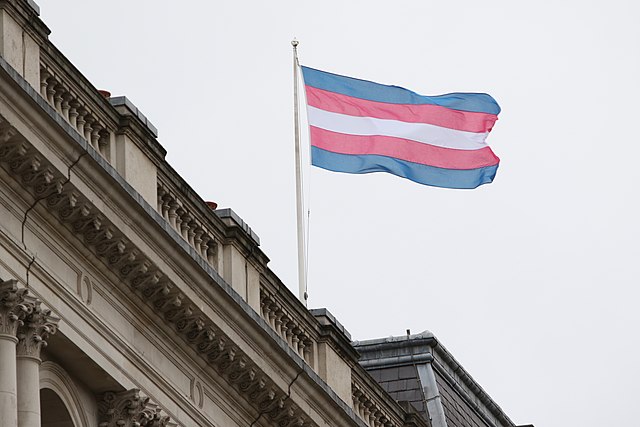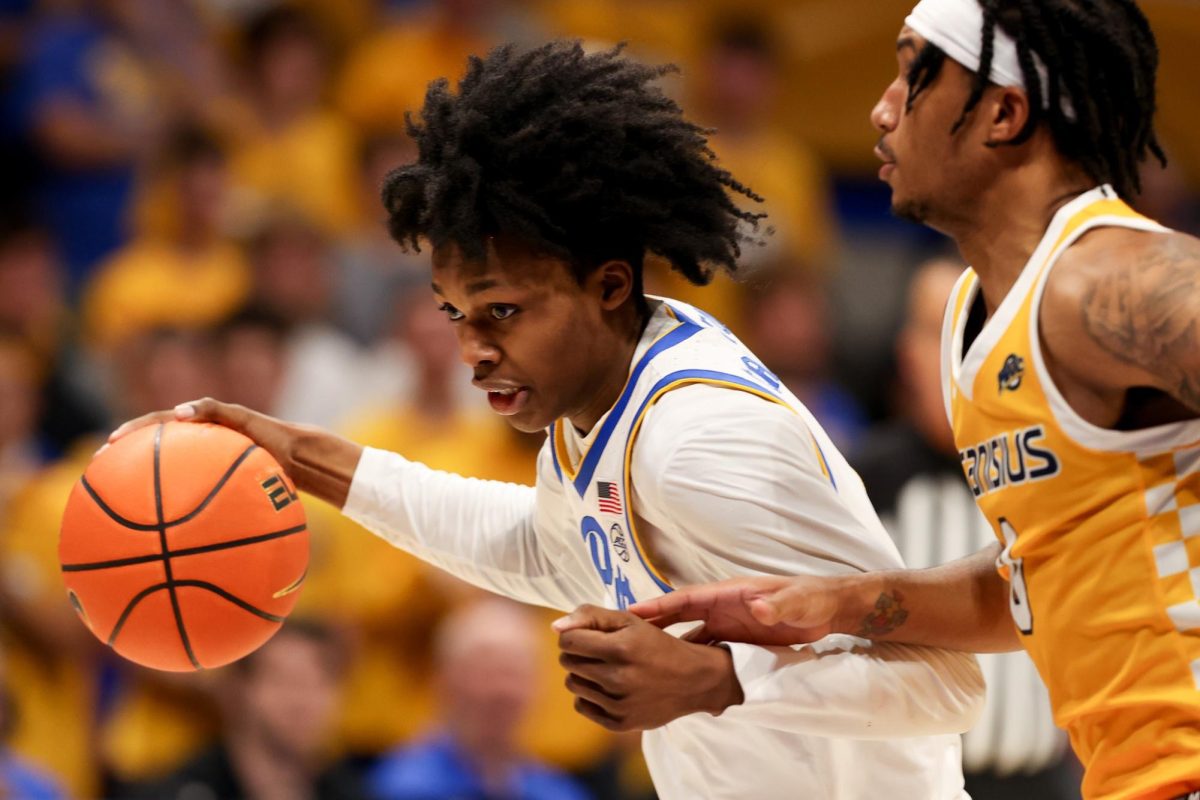‘Putting students in danger’: Transgender students at Pitt share thoughts on upcoming ‘anti-trans’ events
Image via Foreign and Commonwealth Office, Wikimedia Commons
The Transgender Pride Flag flies on the Foreign Office building in London on Transgender Day of Remembrance, Nov. 20, 2017.
March 14, 2023
Laura Mcneil, a transgender student and first-year digital narrative and interactive design major, said she initially applied to Pitt because she believed it was welcoming to queer students. Now she’s reconsidering that assumption.
“Part of why I applied to Pitt is because it seemed like a diverse and welcoming kind of school, and the fact that they would host these sorts of events is just very disappointing to me,” Mcneil said.
In the wake of the upcoming “anti-trans” events scheduled to take place on Pitt’s campus, some transgender students are raising concerns over safety and say they are disappointed by a lack of support from the University. On Monday, Rainbow Alliance released a statement saying that if the University were truly committed to supporting trans, nonbinary and gender-nonconforming community members, they wouldn’t “allow these individuals to propagate their harmful ideas.”
“As an educational institution that hosts such a wide variety of marginalized people, it is truly heartbreaking, as students, to see your administration continue to fail us again and again,” the statement said.
Pitt’s chapter of Turning Point USA will host Riley Gaines, a 12-time NCAA All-American swimmer and vehement critic of transgender athletes competing in women’s sports, on March 27 at 5:45 p.m. in the O’Hara Ballroom.
Turning Point USA will also host Cabot Phillips, an editor at the right-wing website The Daily Wire, on March 24 at 7 p.m. in the Cathedral of Learning. Later, on April 18, Pitt’s College Republicans and the Intercollegiate Studies Institute invited Michael Knowles to debate “transgenderism and womanhood” in the O’Hara Ballroom. Knowles recently called for an eradication of “transgenderism.”
Mcneil said she plans to avoid these events out of fear of what the people attending might think or say.
“I really am not comfortable being near events where people are demonizing and criminalizing my own existence and my own happiness,” Mcneil said. “And it’s not just even about my safety, but these events are trying to take away from other people’s happiness. Hosting these kinds of events and allowing this sort of discussion to be propped up on a podium here on campus is just upsetting.”
Nearly 10,000 people have signed a petition created on March 7 urging the University to cancel these events. In a media statement released Friday, Pitt said it understands the events are “toxic and harmful” for people in the Pitt community, and is committed to “support” people who might be “negatively affected” by the upcoming events.
University spokesperson Jared Stonesifer said registered student organizations have the right to invite “highly provocative” speakers on campus “without University administration deciding what is acceptable and what is not.”
While Mcneil said she’s glad a lot of people signed the petition, she’s still “disappointed” that the University is allowing the events to occur on campus.
“I feel like they’re inherently supporting it by allowing these events to occur, and also when students are asking the university to cancel these events and they say no, that’s inherently a sign of support,” Mcneil said.
Dylan Mitchell, the president of College Republicans, said those that are “shocked” by the topics of the events should “get used to conservative voices.”
“There is no plan to cancel the event whatsoever,” Mitchell, a sophomore law, criminal justice and society and politics and philosophy double major, said. “In fact, those who are shocked by the idea of their beliefs being challenged should get used to conservative voices. We are only beginning to assert the right to speak our beliefs and stand up for truth, and we have no plans to slow down any time soon.”
Liliana Orozco, president of Pitt’s Turning Point USA chapter and a junior law, criminal justice and society major, also said “our voices will not be silenced just because some students might not agree with us” and that the events will be conducted in a “civil manner.”
M., a transgender fifth-year student, said the statement will only further make queer students feel “unwelcome” on campus. The student asked to remain anonymous due to privacy and safety concerns. M. is her first initial.
“I feel like this statement is honestly even worse than saying nothing at all, as they have effectively doubled down on saying that they’re okay with spreading hate speech, making students feel unwelcome on campus and potentially putting students in danger,” M. said.
M. referenced the University’s nondiscrimination policy, which states, “The University does not tolerate discrimination, harassment, or retaliation on these bases and takes steps to ensure that students, employees, and third parties are not subject to a hostile environment in University programs or activities.”
“But even outside of written rules, I feel that a precedent has been set across the country within the past few years, with universities rescinding admissions decisions to students who engaged in racism on social media, that Universities ought to combat hate and marginalization within its student body,” M. said. “So, I think at a bare minimum, Pitt should bar these events from being held within University buildings.”
Cat, another transgender student at Pitt, said the upcoming events will “disrupt education.” Cat asked that her last name be omitted due to privacy and safety concerns.
“They are events which are designed to intimidate and encourage violence against transgender people and transgender students on campus,” Cat, a junior computer science major said. “It’s designed to disrupt the education. It’s just going to bring hateful people to campus which risks the safety of transgender students on campus.”
Cat said canceling the event is the “simplest” way to resolve the issue.
“I mean, the simplest solution would be to just cancel the events, but if they want to provide safety I mean, other than just giving each trans person their own personal bodyguard, which would be absurd, otherwise I don’t know what they could do to improve the safety of trans people on campus” Cat said.
Cat said the University’s actions show that they “are not an ally to queer people” and that if “they were committed to diversity, they would cancel the events.”
M. also said she plans to “stay away” from campus and “skip classes” during the days of the events, to feel safer and avoid running into “transphobic people” on campus.
“My experiences at Pitt as a trans person have never been super positive, but I believed that to a limited degree that there was like a baseline standard of protection against hate speech and discrimination on campus that would prevent things like these events from happening,” M. said. “It’s really disappointing to see that Pitt would protect hate speech like this, but I’m not entirely surprised.”



